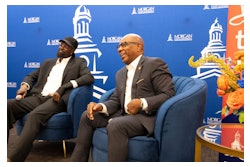Finger Scans Replace Cash at Gonzaga
SPOKANE, Wash.
About 400 students at Gonzaga University are among the first in the nation to use finger scans to pay for meals and other expenses in the campus area.
Sodexho Inc., the company that runs food service operations at Gonzaga, has launched pilot programs at the Spokane, Wash., school and the University of North Texas to see if “biometric finger scans” are workable.
Sodexho spokeswoman Sarah Cody says the company will see how well they work before deciding whether to use the technology at some of the 900 other campuses it serves.
Gonzaga student Scott McCoy uses a finger swipe to pay for things like pancakes at Arny’s, a Gonzaga-area diner.
“It made my parents more comfortable giving me money, because they know what I spend it on,” McCoy says.
The program, known as iMye, operates like a gift or debit card. Students or their families deposit money into an account that can be managed online. When the students swipe their finger over a scanner at campus cafeterias and coffee shops, the scanner reads
the print and performs the transaction.
The program doesn’t use fingerprints or maintain a database of them to verify identity. While students do have their fingerprints scanned, the program uses algorithms to create an identification based on a series of numbers. No images of the fingerprint are kept, says Cody.
Vijay K. Sharma, vice president of sales and business development for iMye, says the finger scans are more secure than cash or credit cards.
“If my mother were asking me that question [about security], I’d say, ‘Mom, signing your name to a receipt for a credit card and handing it over the counter to somebody you don’t know compromises your security much more,’” he says.
Sharma says the system gives parents more knowledge about their children’s spending, and can’t be used to buy alcohol.
Nick Perrault, president of the Gonzaga Student Body Association and an intern working to promote the program, says the fingerprint issue has caused some concern among students. But that generally passes, he says.
“There’s kind of a cool factor,” Perrault says. “Just being able to put down your finger and not whip out a card.”
— Associated Press
© Copyright 2005 by DiverseEducation.com


















